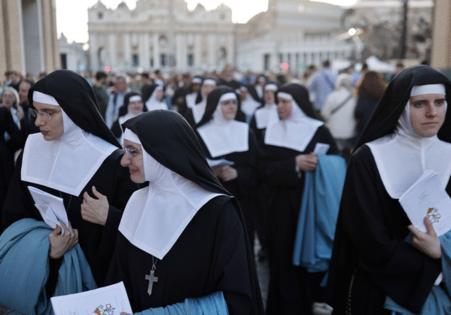Frank Barry: To save Catholicism, let's talk nuns, not popes
Published in Op Eds
The election of an American pope, Leo XIV, is a fitting culmination of a conclave that had the feel of an American presidential election, except shrouded in secrecy and mercifully brief.
Conservatives and liberals rallied around their favorite candidates, dished dirt on the opposition and adopted slogans (“unity” and “diversity”) aimed at swing voters. And like a presidential contest, it fixated public attention — and people’s hope for the future — on the wrong target: a savior-like figure who can deliver us from, if not evil, the other side of the aisle.
One of the underlying causes of political polarization in the U.S. – that all politics is now national instead of local – is afflicting Christianity, too. Among Catholics, it can be more common to talk about the pope’s politics than the parish’s food pantry, partly thanks to pundits more concerned with Vatican machinations than Gospel teachings.
As a result, there’s more public interest in what’s happening with one bishop in Rome, Italy, than all the people in, say, Rome, New York. But what’s happening in Rome, New York — and so many places like it — reflects the need for a new spirit of localism, as opposed to clericalism, within the church.
In 2024, the last Catholic school in Rome, New York, closed its doors. There was recent news of a church closure there, too, owing to a shortage of both priests and parishioners. Such closures are a familiar occurrence across the country. The number of U.S. priests has fallen by nearly half since 1965, making it increasingly common for churches to share priests, if not shut down completely. In many cases, however, closures would not have been necessary if bishops did more to empower those who have long been relegated to second-class status in parish affairs: nuns and lay people.
On the day the world watched Pope Francis being laid to rest, I attended a 75th jubilee celebration for Sister Mary, a 94-year-old nun who lives outside of Philadelphia and is a beloved member of our family. Through her 80s, she devoted her life to teaching the young, assisting the poor and caring for communities, all while living simply and humbly. I’ve learned far more about the Gospel by watching her live than by reading any papal encyclical.
That Pope Francis was so celebrated for the kind of humility that countless nuns display every day was a sad indictment of the upper tiers of the church hierarchy. While the world sang his praises for carrying his own luggage, the nuns who tirelessly bear burdens for their communities receive little of the recognition — and authority — they are due.
At the jubilee mass I attended, the priest noted in a moving homily that Pope Francis considered the church “a field hospital,” and he lauded the sisters for being first in line to care for the wounded, comfort the suffering and support the needy. If churches are truly field hospitals, however, wouldn’t it be better for their doors to remain open under the care of a nun or a lay person, than to close because of a shortage of priests?
Sisters have proven themselves to be effective administrators of hospitals, as well as of schools and charities. And though church law forbids them from consecrating the Eucharist, they can run parish operations, lead worship services, hold Bible study classes, organize charitable work and distribute communion to the sick and infirm — all duties that lay people can perform, too. No papal act is required for such a delegation of authority to occur, only greater public pressure on bishops to allow it. (A little encouragement from Pope Leo XIV would go a long way, too.)
The number of American sisters, like priests, has fallen dramatically. Allowing more sisters to run parishes would not save all churches, of course, but it could save some, while also helping to stem the decline in the vocation. And there are many more lay people who are up to the job, too.
At the jubilee celebration, I spoke with a priest who leads a small, rural parish on a part-time basis. He’s hopeful that his diocese’s next bishop will allow the parish to be run by lay people, with visiting priests saying mass when possible. Otherwise, he worries that after he’s gone — he’s approaching retirement age — the diocese will close the church, and the community will suffer the loss, both spiritually and, given the support it offers its neighbors, materially.
Before we said goodbye, Sister Mary showed us a full-page ad that her order, the Sisters of Saint Joseph, had taken out in the Philadelphia Inquirer in partnership with other orders of sisters. In a beautiful open letter that made no explicit mention of politics, the sisters made plain their disapproval of the current climate, lamenting the “sudden and devastating changes severely impacting people in our communities,” and urging people to join them in loving their neighbors, welcoming the stranger, caring for the vulnerable, speaking truth and working for justice.
“Only when ‘We the People’ lead with compassion and empathy,” they wrote, “will a future filled with hope for all generations be possible.” We need more bishops and priests to fearlessly shout that message from the pulpit — and to let nuns and lay people join them.
_____
This column reflects the personal views of the author and does not necessarily reflect the opinion of the editorial board or Bloomberg LP and its owners.
Frank Barry is a Bloomberg Opinion columnist and member of the editorial board covering national affairs. He is the author of the new book, "Back Roads and Better Angels: A Journey Into the Heart of American Democracy."
_____
©2025 Bloomberg News. Visit at bloomberg.com. Distributed by Tribune Content Agency, LLC.




























































Comments